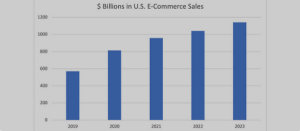E-commerce can significantly contribute to the growth of small businesses in various ways. Here are several ways in which e-commerce can drive small business growth:

How E-Commerce Can Drive Small Business Growth
Table of Contents
Toggle1. Global Reach:
E-commerce is like a passport for small businesses, granting them access to a global audience without the need for a physical storefront in every corner of the world. It’s like opening the doors to new markets and connecting with customers beyond geographical boundaries.
2. 24/7 Accessibility:
Imagine your business never sleeping. E-commerce makes this a reality, allowing customers to shop at any hour. It’s like having a round-the-clock store that caters to early birds, night owls, and everyone in between, boosting sales opportunities and revenue.
3. Reduced Operational Costs:
Think about the costs of running a physical store – rent, utilities, staff. E-commerce swoops in as the cost-effective superhero, eliminating these expenses and letting businesses use their resources more wisely. It’s like trimming unnecessary fat, leaving room for lean and efficient operations.
4. Marketing Opportunities:
E-commerce platforms are like a treasure trove for marketing. They offer tools and analytics that help small businesses speak directly to their target audience. It’s like having a personalized megaphone for social media, email campaigns, and SEO, making your brand shine in the digital spotlight.
5. Data Analytics for Informed Decision-Making:
E-commerce platforms are like a wise mentor, providing insights into customer behavior, preferences, and buying patterns. Armed with this knowledge, small businesses can make informed decisions, enhance their offerings, and create tailor-made marketing strategies. It’s like having a secret weapon for understanding and delighting customers.
6. Customer Convenience:
E-commerce is the genie granting the wish of shopping convenience. It’s like bringing the store to customers’ fingertips, allowing them to shop from the comfort of their couch at any time. This convenience transforms into customer loyalty, repeat business, and positive word-of-mouth.
7. Diversification of Sales Channels:
E-commerce is the artist’s palette, allowing small businesses to paint on various online canvases. Selling through different platforms, be it marketplaces, social media, or their own websites, reduces dependence on a single channel. It’s like building a diverse portfolio that adds resilience to the business.
8. Cost-Effective Scalability:
E-commerce platforms are like magic beans for small businesses, offering scalable solutions that grow with them. Starting small and expanding online operations is like planting seeds that flourish without the heavy burden of upfront costs.
9. Streamlined Operations:
E-commerce platforms are the orchestra conductor, harmonizing inventory management, order processing, and payment systems. This efficiency is like a well-choreographed performance, leading to faster order fulfillment, fewer errors, and happier customers.
10. Competitive Advantage:
E-commerce is the knight in shining armor, providing small businesses with a competitive edge in the digital age. Adapting to changing consumer trends and preferences is like wielding a powerful sword, ensuring they not only survive but thrive in the market.
In conclusion, embracing e-commerce is like giving small businesses a superhero cape. It empowers them to broaden their horizons, cut unnecessary costs, and operate with the agility needed for growth in the modern business landscape. It’s not just a tool; it’s a game-changer that propels small businesses towards sustained success.
